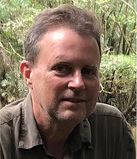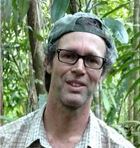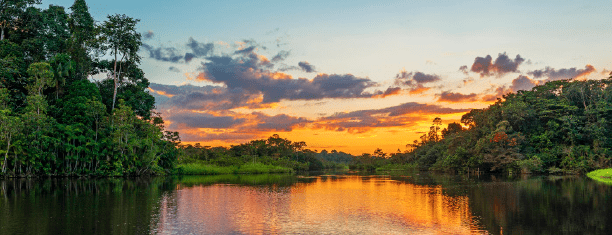Program Package
$TBD/Person
Fee includes:
(does not include airfare to Ecuador)
- Tuition for six undergraduate credits in ANTH and BIOL
- Accommodations and on-site meals
- Travel Insurance
- In-country transportation for course-related work
- Course materials
Participants are responsible for:
- Participants are responsible for transportation to and from Ecuador, local transportation (not covered by class), passport/visa fees, individual sightseeing, incidental expenses and all meals except those listed above.
TBA
Location: Quito, Ecuador
Pre-trip orientation meeting will be held TBD.
The group will convene in Quito, Ecuador, on TBA. Participants may extend their stays at their own expense. (Airfare is not included in the fee.)
Open only to students traveling to Ecuador.
About the Experience
The course examines Amazonian cultural knowledge of water, weather, plant and animal life, seeking to uncover underlying assumptions that constitute a systematic, if implicit, religious philosophy of nature. It also teaches students how to ask key questions and to carry out qualitative ethnographic research in Cultural Anthropology and the Humanities. How do Amazonian people understand their relatedness to a natural world believed to be alive and human-like? How do they understand the hidden social lives of plants and animals? What is believed to cause new species to emerge or to become extinct? How are human emotions related to the seasonal cycle of rains? How is plant and animal ecology believed to serve as a model for understanding human society and vice versa? What aesthetic, emotional or religious practices were developed to create bonds of empathy or communication between human beings and the natural world?
Instructors:

Tod Swanson, Ph.D.
Arizona State University
Email: tod.dillon.swanson@gmail.com
Tod Swanson, Ph.D. is an associate professor at Arizona State University and he is the director of the Andes and Amazon Field School. He is a specialist in Amazonian culture and environment. His area of research includes indigenous relations to plant and animal species and Quichua linguistics.

Lee Dyer, Ph.D.
University of Nevada, Reno
Email: nolaclimber@gmail.com
Lee Dyer, Ph.D., is a tropical ecologist whose current research focusses on tritrophic interactions, chemical ecology, biodiversity and conservation in natural and managed ecosystems.
click to expand/collapse Registration and Information
- Deposit and registration through MyNevada
- It is required each student register for the Smart Traveler Enrollment Program (STEP), which is a free service provided by the U.S. Department of State https://step.state.gov/.
- Additional University travel documents are required to be completed prior to departure (no exceptions). Contact Academic Credit Options at ACO@unr.edu. Program pending approval from the University Travel Office.
University credit, included in the fee, will be earned in both of these courses:
- ANTH 411C Peoples and Cultures of the Amazon
- BIOL 450 Special Topics: Tropical Biology
For registration assistance, please contact ACO.
For course content information, please contact the course instructors.
Tod Swanson, Ph.D.
Email: tod.dillon.swanson@gmail.com
Lee Dyer, Ph.D.
Email: nolaclimber@gmail.com
click to expand/collapse Deposit and Fee Payment Schedule
A $500 non-refundable deposit must be paid to obtain permission to register in this program. Deposit is applied toward total program fee of $TBD. If the final payment is not received by TBD, it will be assumed the participant has withdrawn from the trip (see Drop Policy).
click to expand/collapse Drop and Refund Policy
If you drop the program, for any reason, and a replacement participant cannot be found to take your place, a refund may not be possible. Due to the costs and logistics of travel programs, refunds will consist only of that portion of the payment that is retrievable from the various agencies used in providing the program.
click to expand/collapse Passport Requirements
It is imperative participants acquire valid U.S. passports and any other required travel documents. Passport processing may take 10-12 weeks, so plan accordingly. Depending on the country, you may be required to apply for a visa. The cost of visas can vary widely across countries. Check with the U.S. Department of State. If you are not a U.S. citizen, you should check with the embassy of your home country and the U.S. Customs and Border Protection department to determine if you need to take any action on your passport.
click to expand/collapse Standard Responsibility Clause
The University acts as an agent for the companies and individuals whose services have been engaged in the carrying out of the tour and, in consequence, accepts no responsibility for accidents, damages, baggage losses, delays due to strikes or to faults of any company used for carrying out this tour. Prices are subject to change without notice. The right is reserved to decline to accept or retain any person as a member of the tour at any time prior to departure or in the course of the tour. In the unlikely event that the services or accommodations are not available as stated, due to reasons beyond our control, we will make every effort to provide accommodations of equal standard and quality for your safety and convenience. After the initial nonrefundable deposit, refunds will consist only of that portion of the payment retrievable from the various agents. All fees are required to be paid in full by the Summer First Session deadline.
Notes:
- Dates and costs are subject to change depending upon rate increases and currency exchanges.
- A portion of program fees may be used to pay hosting expenses.


